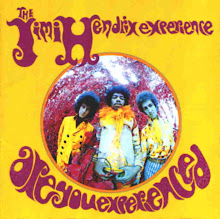 The Jam, one of the great British bands, was a thick-as-thieves punk trio who bashed out mod anthems, led by the eternally boyish Paul Weller. On albums such as 1978's All Mod Cons, 1980's Sound Affects, and the 1982 live summary, Dig the New Breed, Weller sang his tales of ordinary English life, envisioning a nation of sad-eyed boys dressing up to go race their Vespa scooters through the streets while a hundred lonely housewives clutched empty milk bottles to their hearts. The fantasy struck a chord in the U.K., where Weller came to be revered with fanatical devotion. Although the Jam never had an American hit and broke up 20 years ago, these sharp-dressed mods have influenced practically every decent British rock band since.
The Jam, one of the great British bands, was a thick-as-thieves punk trio who bashed out mod anthems, led by the eternally boyish Paul Weller. On albums such as 1978's All Mod Cons, 1980's Sound Affects, and the 1982 live summary, Dig the New Breed, Weller sang his tales of ordinary English life, envisioning a nation of sad-eyed boys dressing up to go race their Vespa scooters through the streets while a hundred lonely housewives clutched empty milk bottles to their hearts. The fantasy struck a chord in the U.K., where Weller came to be revered with fanatical devotion. Although the Jam never had an American hit and broke up 20 years ago, these sharp-dressed mods have influenced practically every decent British rock band since.Weller, the self-proclaimed "Cappuccino Kid," was only 18 when the Jam debuted in 1977 with In the City. He yelled his clumsy youth-explosion lyrics over frantic guitar riffs, but even when the band slowed it down for the naively touching "Away From the Numbers," his Woking accent was too thick for any American to comprehend, one of the reasons the Jam never came close to cracking the U.S. This Is the Modern World had weaker songs, as sophomore albums do, except for "Life Through a Window." But All Mod Cons made Weller a boy wonder over in Britannia, with a cover of the Kinks' "David Watts" as a touchstone for Weller's catchy little vignettes, especially the funny "A-Bomb in Wardour Street" and the politically charged "Down in the Tube Station at Midnight." (Despite the somewhat bizarre claim in Jon Savage's England's Dreaming that the Jam were Tories, they were the U.K.'s most energetically left-wing pop stars.)
From their Who/Kinks/Creation riffs to their mohair suits, the Jam touched off a glorious mod revival, inspiring followers like the Merton Parkas, the Jolt, and Secret Affair, whose 1979 hit "Time for Action" perfectly summed up the mod lifestyle: "Looking good's the answer/And living by night." But Setting Sons was a pompous concept album, taking the whole influenced-by-the-Who business a little far, despite "Thick as Thieves," "When You're Young," and "Saturday's Kids," a boyish answer to Blondie's "Sunday Girl." The Jam had its first #1 U.K. hit with "Going Underground" and followed with the magnificent Sound Affects. The album offers the poignant teen-boy ache of "Start!," "Monday," and "Boy About Town"; the sha-la-la harmonies of "Man in the Corner Shop"; a Shelley poem on the back cover; and the Jam's best song ever, the acoustic lament "That's Entertainment," which can break your heart even if you have no idea what Weller's saying.
 The Jam faltered with the R&B moves of The Gift -- why these three decidedly unfunky gentlemen decided it was their destiny to get on the good foot, the world will never know. "Town Called Malice" was a gem with an elastic bass line and a howling organ, while "Ghosts" was an elegiac ballad. But the lads were rich adults now and could no longer pretend to be the skinny-tied, bowling-shoe-wearing, Union Jack-waving, tube-station-frequenting adolescents of "Boy About Town" or "Saturday's Kids." So they bade farewell with the superb single "Beat Surrender," though Weller kept pursuing his R&B and classic-rock influences, first as the Style Council and then solo, aging from the Cappuccino Kid to the Duke of Decaf but still sounding touched by the hand of mod.
The Jam faltered with the R&B moves of The Gift -- why these three decidedly unfunky gentlemen decided it was their destiny to get on the good foot, the world will never know. "Town Called Malice" was a gem with an elastic bass line and a howling organ, while "Ghosts" was an elegiac ballad. But the lads were rich adults now and could no longer pretend to be the skinny-tied, bowling-shoe-wearing, Union Jack-waving, tube-station-frequenting adolescents of "Boy About Town" or "Saturday's Kids." So they bade farewell with the superb single "Beat Surrender," though Weller kept pursuing his R&B and classic-rock influences, first as the Style Council and then solo, aging from the Cappuccino Kid to the Duke of Decaf but still sounding touched by the hand of mod.Of all the Jam's many overlapping repackages, the original 1983 double-vinyl Snap! is still the best, blasting off with the essential early hits "In the City" and "All Around the World." But it's truncated on CD and includes only the inferior demo version of "That's Entertainment," so the 1991 Greatest Hits is preferable. Snap! has the version of "The Modern World" on which Weller yells, "I don't give a damn about your review!"; on Greatest Hits, it's "I don't give two fucks." The poorly selected 2003 Sound of the Jam omits necessities like "All Around the World" and "The Bitterest Pill." Extras has ace covers of the Who's "So Sad About Us" and the Beatles' "And Your Bird Can Sing"; Direction Reaction Creation is an impersonal but functional box set. Dig the New Breed, the Jam's superb live album, has dramatic renditions of "Ghosts," "Going Underground," and "In the Crowd," plus a version of "That's Entertainment" even more moving and incomprehensible than the original. A final thought, from "Boy About Town": "There's more than you can hope for in this world."






